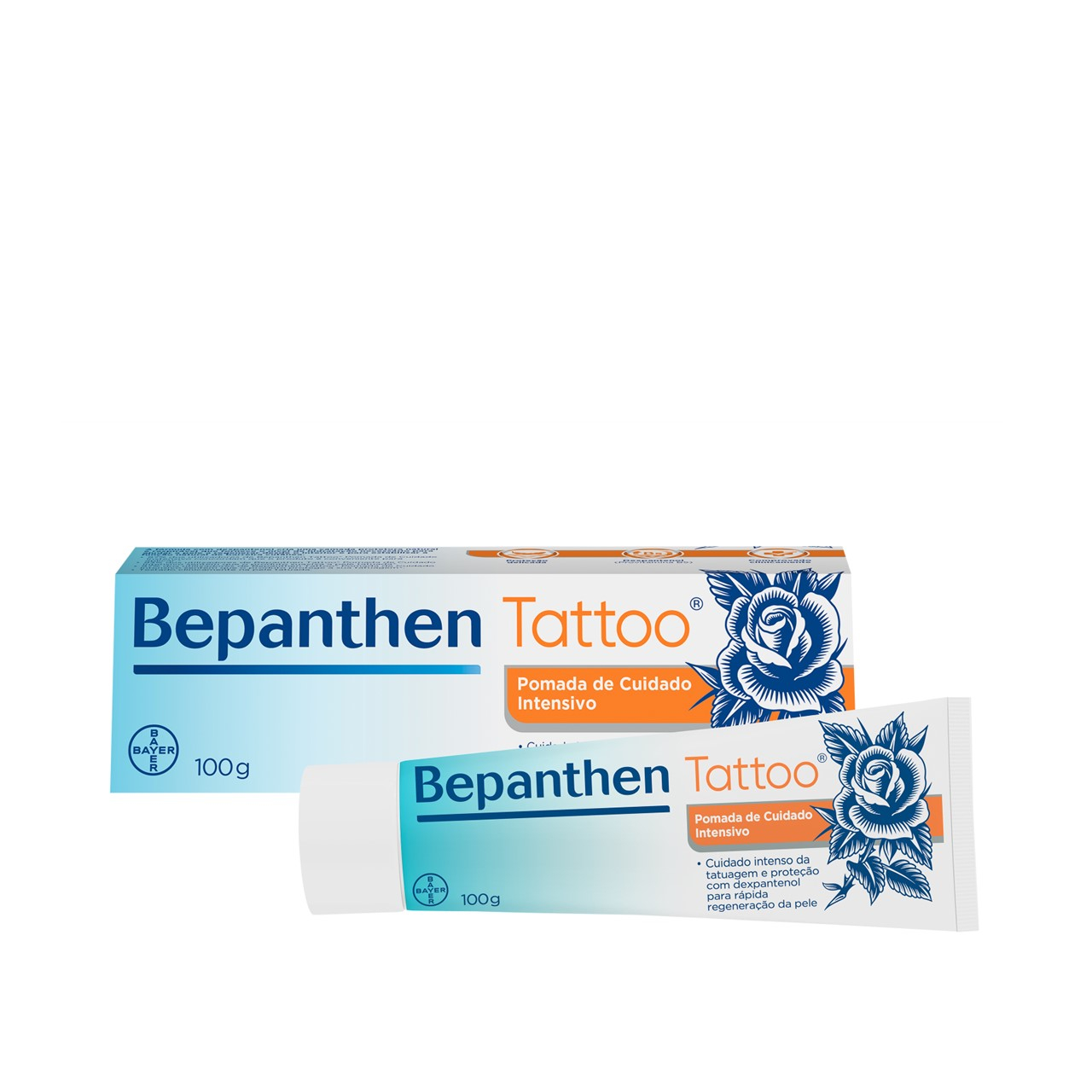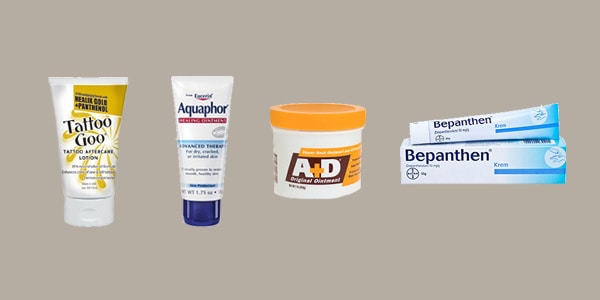In the world of tattoos, aftercare is just as crucial as the artistry itself. One product that has gained attention for its potential benefits in tattoo healing is Bepanthen, a well-known brand name for products containing dexpanthenol, a provitamin of B5. This article delves into the role of Bepanthen in tattoo aftercare, exploring its benefits, application techniques, and how it can contribute to the overall tattoo experience.
Understanding Bepanthen and its Properties

Bepanthen, a trusted name in skin care, offers a range of products aimed at promoting healing and soothing various skin concerns. The key ingredient, dexpanthenol, is a precursor to pantothenic acid (Vitamin B5), known for its ability to support skin regeneration and hydration.
The Science Behind Bepanthen for Tattoos
When it comes to tattoos, the skin undergoes a significant process. The skin barrier is broken, and the skin’s natural healing process is triggered. Bepanthen, with its active ingredient, dexpanthenol, aids in this healing process by stimulating cell growth and maintaining skin moisture. This is particularly beneficial during the initial stages of tattoo healing, where the skin is most vulnerable.
Additionally, Bepanthen's emollient properties help create a protective barrier on the skin, locking in moisture and preventing the tattoo from drying out excessively. This is crucial as dry skin can lead to itching, which may disrupt the healing process and potentially damage the tattoo.
Real-World Experiences with Bepanthen
Tattoo enthusiasts and professionals have shared positive experiences with Bepanthen. Many report faster healing times and reduced irritation when using Bepanthen as part of their tattoo aftercare routine. The product’s non-greasy formula is often praised for its ease of application and quick absorption, making it a convenient choice for daily use.
| Benefit | Real-World Impact |
|---|---|
| Soothing Effect | Reduces post-tattoo inflammation and redness. |
| Hydration | Prevents tattoo drying, a common cause of itching. |
| Healing Acceleration | Speeds up the skin's natural healing process. |

How to Incorporate Bepanthen into Tattoo Aftercare

Application Techniques
Applying Bepanthen to a fresh tattoo is a simple process. Here’s a step-by-step guide:
- Clean the Tattooed Area: Ensure the tattoo is clean and free from any residual ink or blood. Use a mild, unscented soap and warm water.
- Pat Dry: Gently pat the tattooed skin dry with a clean towel. Avoid rubbing, as this can irritate the skin.
- Apply Bepanthen: Squeeze a small amount of Bepanthen onto your fingertips or a clean cotton swab. Gently apply it to the tattooed area in a thin layer. You want to cover the entire tattoo without overloading it.
- Massage Gently: Use light, circular motions to massage the Bepanthen into the skin. This helps ensure the product is fully absorbed and can reach deeper layers of the skin.
- Repeat Regularly: For optimal results, repeat this process 2-3 times a day during the initial healing phase (typically the first week). After that, reduce the frequency to once or twice daily until the tattoo is fully healed.
Best Practices and Tips
While Bepanthen is generally well-tolerated, it’s essential to follow these tips for the best results:
- Avoid Over-Application: While it's tempting to apply a thick layer, this can actually slow down the healing process and increase the risk of irritation. A thin, even layer is sufficient.
- Keep the Tattoo Covered: After applying Bepanthen, consider covering the tattoo with a breathable bandage or gauze. This can help protect the tattoo from friction and further promote healing.
- Stay Consistent: Consistency is key. Stick to your aftercare routine, including Bepanthen application, to ensure the best possible outcome for your tattoo.
Potential Benefits and Considerations
Benefits of Bepanthen for Tattoo Aftercare
Bepanthen offers several advantages when used in tattoo aftercare:
- Reduced Inflammation: The anti-inflammatory properties of dexpanthenol can help calm the skin, reducing redness and swelling associated with the tattooing process.
- Enhanced Healing: By promoting cell regeneration and maintaining skin hydration, Bepanthen accelerates the healing process, leading to quicker recovery times.
- Improved Tattoo Quality: Proper hydration and care during the healing phase can result in a sharper, more vibrant tattoo. Bepanthen helps lock in moisture, preventing the tattoo from fading or blurring due to dry skin.
Considerations and Precautions
While Bepanthen is generally safe, there are a few considerations to keep in mind:
- Allergies: While rare, some individuals may be allergic to dexpanthenol or other ingredients in Bepanthen. Always perform a patch test on a small area of skin before applying it to your tattoo.
- Overuse: While Bepanthen is beneficial, excessive use can lead to skin occlusion and potential irritation. Follow the recommended application guidelines to avoid overuse.
- Consult a Professional: If you have any concerns or specific skin conditions, it's best to consult with a tattoo artist or dermatologist before using Bepanthen or any other aftercare product.
Expert Insights and Recommendations
Many tattoo artists and skin care professionals recommend Bepanthen as a reliable aftercare option. Its gentle yet effective formula makes it suitable for various skin types, including sensitive skin. Additionally, Bepanthen’s affordability and accessibility make it an attractive choice for those seeking quality tattoo aftercare.
According to renowned tattoo artist [Artist Name], "Bepanthen has been a game-changer for many of my clients. It's easy to use, and the results speak for themselves. I often recommend it as part of a comprehensive aftercare routine."
Conclusion: Bepanthen’s Role in Tattoo Aftercare

Incorporating Bepanthen into your tattoo aftercare routine can provide numerous benefits, from reducing inflammation to promoting faster healing. Its proven effectiveness, coupled with its gentle formula, makes it a top choice for both tattoo artists and enthusiasts.
As with any product, individual results may vary. It's important to listen to your skin and adjust your aftercare routine as needed. Remember, proper aftercare is crucial for maintaining the longevity and vibrancy of your tattoos.
FAQ
Can I use Bepanthen on an old tattoo to rejuvenate it?
+
While Bepanthen is primarily intended for new tattoos, some users have reported positive results when using it on older tattoos. It can help revive the tattoo’s color and hydration, making it appear more vibrant. However, results may vary, and it’s best to consult with a tattoo artist or dermatologist for personalized advice.
How does Bepanthen compare to other tattoo aftercare products?
+
Bepanthen is unique in its focus on hydration and cell regeneration. While other aftercare products may offer similar benefits, Bepanthen’s gentle formula and proven effectiveness make it a popular choice. Ultimately, the best aftercare product depends on individual skin type and preferences.
Are there any alternatives to Bepanthen for tattoo aftercare?
+
Yes, there are several alternatives available. Some popular options include tattoo-specific aftercare balms and lotions, as well as natural remedies like coconut oil or aloe vera. The key is to choose a product that suits your skin type and provides the necessary hydration and healing support.